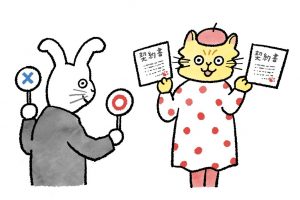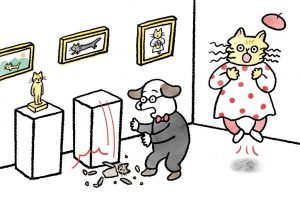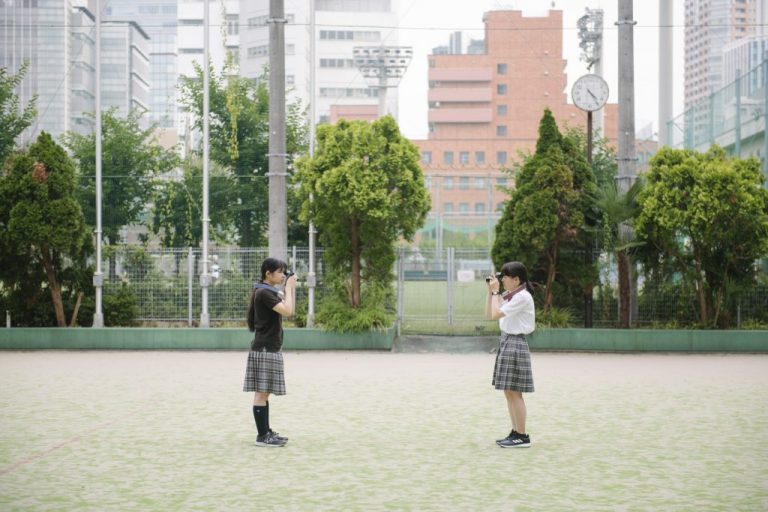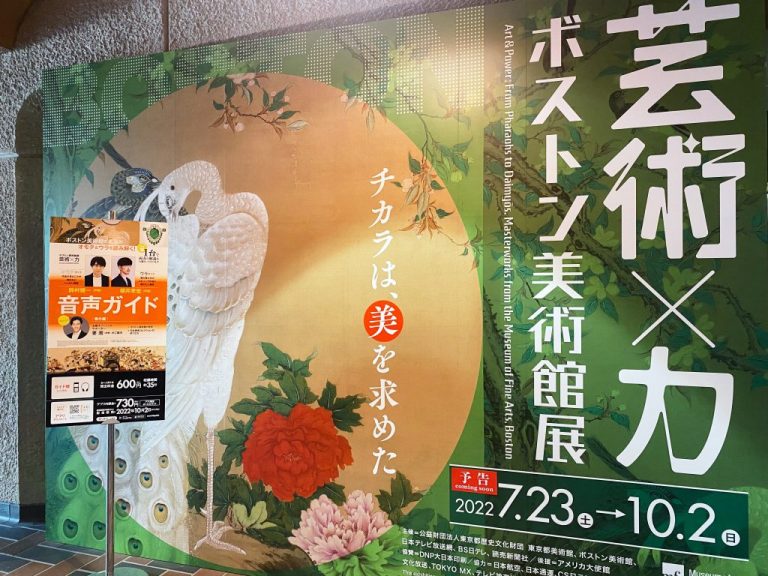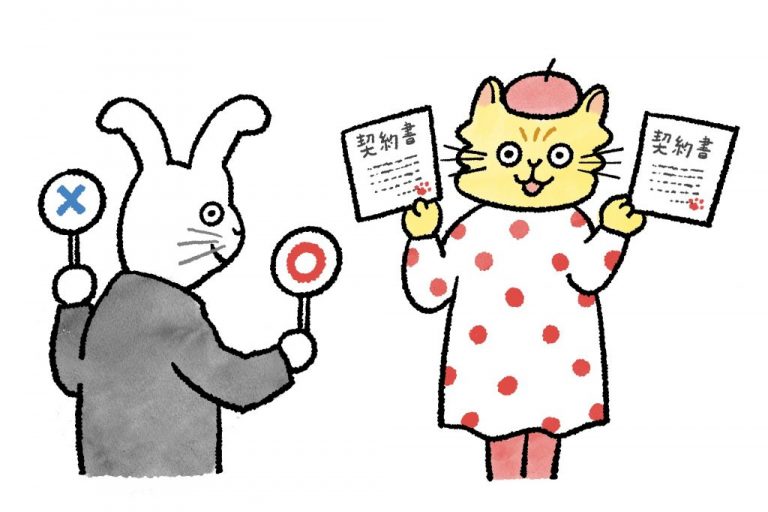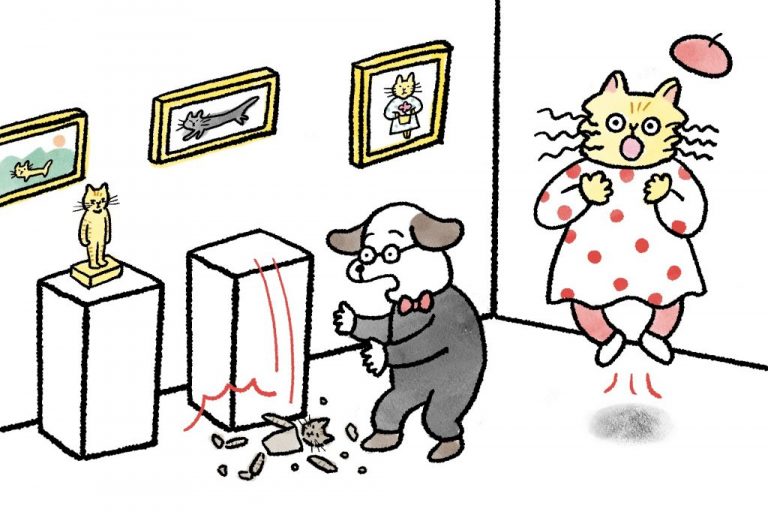Left: Consulter Kumajiro
Center, Right: Lawyers Maruumi, Kakuyama
Art Law What if the purchaser alters the artwork without permission?
Art Emergency Hotline!
No.001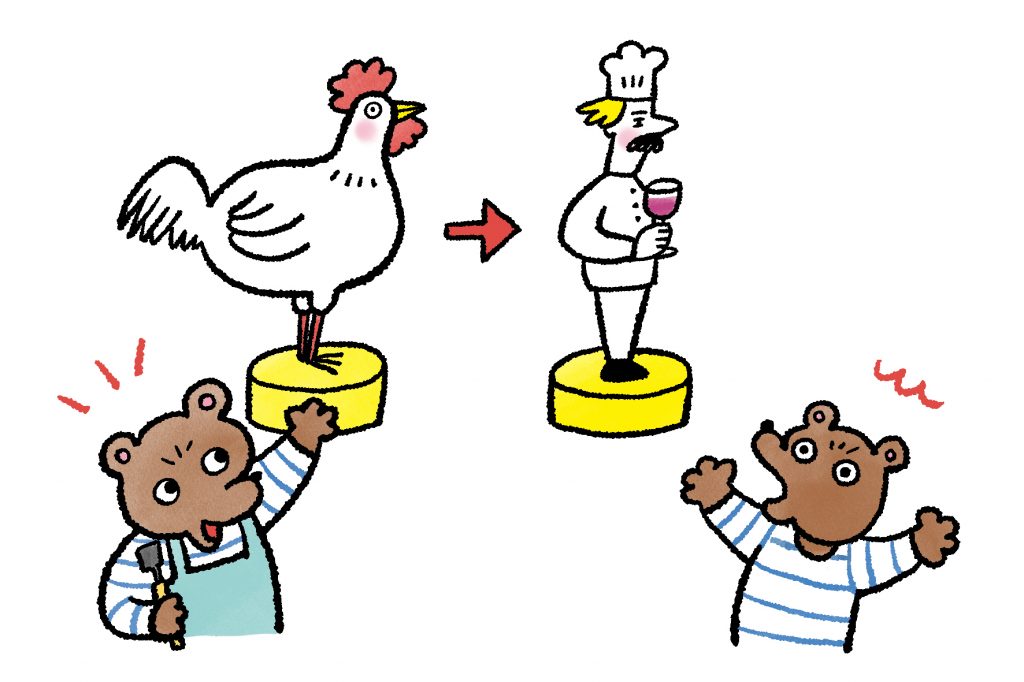
Emergency Art Aid provides urgent assistance for distressed artists. Several legal professionals answer to a range of consulters each time. The law does not restrict your creative activities, and having the right knowledge can provide vital support.
This time, consultation is about “What if the purchaser arbitrarily alters the artwork?” If someone who purchased your work makes unauthorized modifications to it, how far can the artist assert their rights regarding that action?
Illustration: Kaeko Akaike
Cooperation and supervision: Arts and Law
Editor: Yuko Sakamoto
Translation: Kae Shigeno
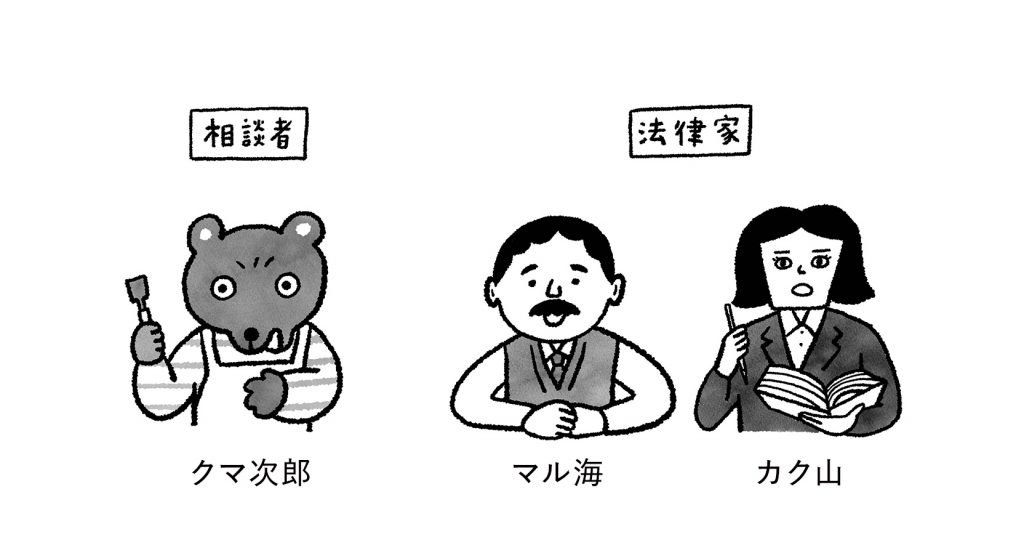
 Kumajiro
Kumajiro
Hello. I’ve been creating sculpture (objet d’art) pieces. Something really shocking happened, and I don’t know what to do about it.
 Maruumi
Maruumi
Hello. What happened?
 Kumajiro
Kumajiro
A few years ago, a company ordered a piece from me to display in a newly opened store, and I created a piece that suited the concept of that store. However, recently, the store changed its concept, and they altered my piece without my consent because it no longer matched their image. I didn’t hear anything about this beforehand. Although they purchased it, it’s still my artwork, and I feel a mix of sadness and frustration… Is it possible for me to file a complaint in this situation?
 Maruumi
Maruumi
That’s shocking indeed. Let’s consider it together in light of the law.
 Kakuyama
Kakuyama
In this case, first, we need to confirm the rights involved. Broadly speaking, there are two main aspects. The first is who holds the “ownership rights” as the physical object. The second is which party holds the “copyright” as the creator. How are these outlined in the contract?
 Kumajiro
Kumajiro
There are documents with details like delivery dates and amounts (such as purchase orders, delivery notes, receipts), but it seems we didn’t have a formal contract…
 Kakuyama
Kakuyama
I see. In cases like this, ownership rights often transfer to the purchasing store. From the perspective of ownership, it can be difficult for others to contest how one handles their possessions. However, altering the work raises questions about whether the artist’s copyright has been infringed upon, considering the aspect of modifying the expression of the artwork. It depends on who holds the copyright and the extent of the modifications made to the piece.
 Maruumi
Maruumi
Regarding alterations made by others to the artwork, under copyright law, the creator is protected by two rights: the “right of adaptation” and the “right of integrity.”
Legal terms for this installment
Right of Adaptation
One of the rights (copyright) established to protect the economic interests of the creator. It is the right to create another work by modifying while retaining the creative characteristics of the original work and adding different creative expressions not found in the original work. It serves to prevent the unauthorized creation of another work using the creativity inherent in the original work.
Right of Integrity
One of the moral rights (authorship rights) established to protect the personal interests of the creator, as the work is an expression of the creator’s thoughts and emotions. It is the right to prohibit modifications such as changes or excisions that go against the creator’s intentions. It serves to protect the creator from being defamed or emotionally harmed.
 Kumajiro
Kumajiro
It’s quite complex, please explain it in simpler terms.
 Maruumi
Maruumi
For example, when creating animation or manga based on a novel, you need the consent of the original author. This is what we refer to as the “right of adaptation.” If consent isn’t obtained beforehand, the original author can claim that this right hasn’t been respected. However, this right can be transferred to others, so it’s crucial to clarify who it belongs to at the time of the contract.
And the “right of integrity” protects the core aspects of the creator’s vision, concept, and societal evaluation that they don’t want altered. This right is tied to the artist personally and cannot be transferred to anyone or anywhere.
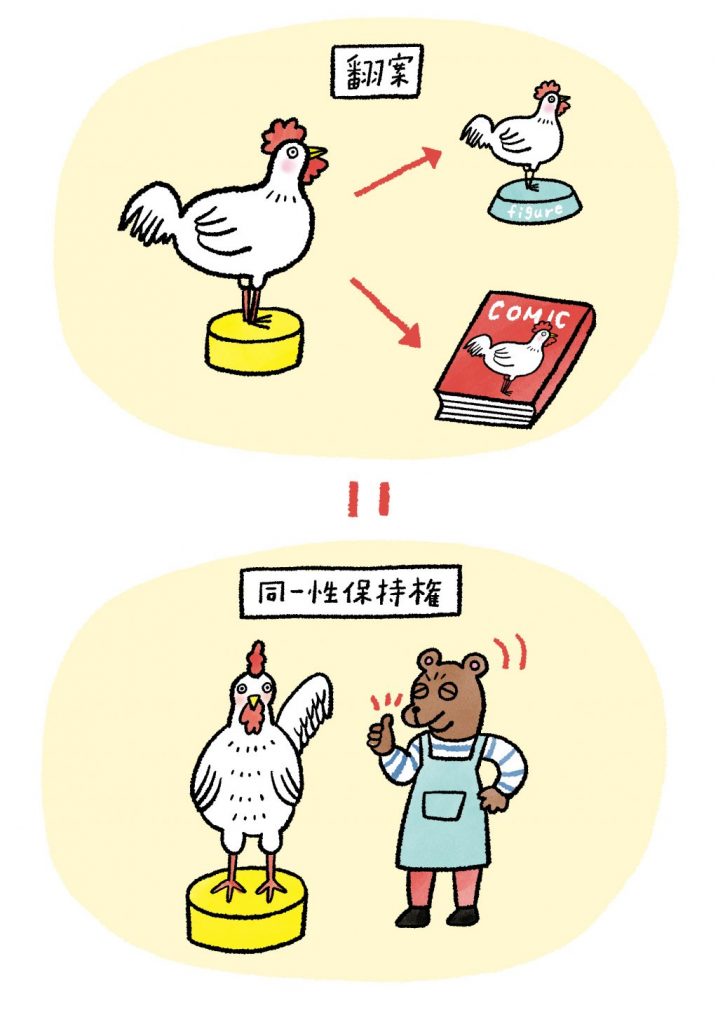
Top: Adaptation
Bottom: Right of Integrity
 Kumajiro
Kumajiro
So, we can raise objections based on these two rights?
 Kakuyama
Kakuyama
That’s correct. If the creator retains the “right of adaptation,” even if someone purchases the work, they cannot modify it into another work without the creator’s permission. However, if the creator has transferred the “right of adaptation” to the purchaser, it becomes difficult for the creator to claim infringement if someone modifies the work without their permission. Similarly, regarding the “right of integrity,” while it cannot be transferred, if the creator has entered into a contract stating that they won’t exercise this right, it also becomes challenging to assert it. Many formal contracts, especially those of corporations, include clauses regarding both the transfer of the “right of adaptation” and the non-exercise of the “right of integrity.” Without such a formal contract, the extent of modification made to the artwork remains unclear.
 Kumajiro
Kumajiro
Actually, the buyer of my piece changed from a yakitori restaurant to an Italian restaurant, and my artwork had its colors repainted. In addition, parts of it were removed and attached elsewhere, completely altering its original form and impression as an artwork. They even removed my signature from the pedestal, claiming it was because of that…
 Kakuyama
Kakuyama
I see. The extent of the modifications is crucial. For instance, minor changes like transforming a Japanese-style hand towel into a Western-style chef’s hat are often considered acceptable. However, if the modification is so drastic that it no longer resembles the original form, it could be argued that it’s no longer the original work but a separate entity. In such cases, there might be no infringement of the right of adaptation or the right of integrity.
 Kumajiro
Kumajiro
Do I have no choice but to give up then… (tears).
 Maruumi
Maruumi
Even if the extent of modification is extremely minor or if the artwork itself remains untouched, if the owner utilizes it in a way that goes against the artist’s principles or damages their reputation or societal evaluation (referred to as “infringement of moral rights”), it may constitute a violation. On the other hand, if the artwork is so heavily modified that it no longer resembles the original form and the ownership hasn’t been transferred to the buyer, it could be considered as defiling or destroying one’s property, allowing for a claim for damages based on ownership rights. Also, it may be possible to assert claims against unwanted modifications based on the right of integrity by identifying parts where elements of the original work remain.
 Kakuyama
Kakuyama
If the process and scenes of the significant modification, to the point where the original form is no longer recognizable, are publicized to the restaurant’s customers or on social media, it is possible to file a claim for infringement of the right of integrity.
In any case, it is essential to have clear contracts in place regarding the “ownership rights,” “right of adaptation” included in copyright, and the exercise of the right of integrity to avoid such situations. If not specified in the contract, copyright, such as adaptation rights, typically remains with the creator, and the right of integrity can be exercised. However, even without a formal contract, an agreement can be deemed to have been made to transfer or not exercise rights depending on the circumstances.
 Maruumi
Maruumi
When you’re about to enter into a contract, be sure to carefully review any contract documents provided by the other party. If there’s a clause regarding the “right of integrity” that states the purchaser won’t exercise it, it means they’re gaining advantageous terms. This could potentially open up room for negotiation regarding the sale price or production conditions.
 Kumajiro
Kumajiro
I’ll go over the documents from the time of order again. Also, I’ll search to see if there are any videos from the restaurant. It seems difficult to revert the artwork to its original state, but if there are negotiation points, I’ll discuss them with the other party.
I’ve come to realize the importance of confirming such conditions in advance. In the future, I’d like to ensure proper contracts are drawn up. However, it feels a bit difficult or resistant to present or object to overly detailed or strict conditions to customers who commission or purchase artwork.
 Kakuyama
Kakuyama
If it’s difficult to remove the clause “not exercising the right of integrity” from contracts with buyers or companies, it might be helpful to list “things you don’t want” separately and make a contract where only those points are adhered to.
In addition, if you have sites where you showcase or sell your artwork, it could be beneficial to display “guidelines” containing such conditions beforehand. You can then ask those who agree to proceed with the purchase process. This could serve as an additional precautionary measure.
 Kumajiro
Kumajiro
In that case, it feels like I can communicate my wishes without coming off as too assertive!
 Maruumi
Maruumi
Purchasing online-only or taking preventive measures like this situation can be effective, but please don’t rely solely on that. Contracts prioritize the most recent date. If it ultimately involves offline interactions, I recommend double-checking the presented terms and preferably exchanging contracts in written form (even electronically).
 Kakuyama
Kakuyama
A “contract” isn’t about binding the other party but rather about protecting mutual rights and facilitating smooth transactions. To avoid unpleasant situations later on, it’s important to honestly convey your wishes and find mutually agreeable conditions.
If you have any uncertainties or concerns, consulting with a third party knowledgeable in legal matters is the best course of action. There are also channels that can refer you to specialized institutions, so please make use of them.
Tokyo Support Center for the Arts and Culture ARTNOTO
The consultation service of ARTNOTO is a joint project by the Tokyo Metropolitan Government and the Tokyo Metropolitan Foundation for History and Culture’s Arts Council Tokyo, fully opened in October 2023. It serves as a hub primarily online, supporting artists and cultural stakeholders in sustaining their activities and connecting them to new endeavors through three main functions: “Consultation Services,” “Information Provision,” and “Educational Programs.”
We assist artists and cultural stakeholders in Tokyo facing various concerns and challenges, such as wanting to learn about public support and private grants available for cultural activities, understanding how to file taxes or approach copyright issues, seeking advice on handling harassment, or needing guidance on how to sustain organizational activities. Depending on the nature of the inquiry, we collaborate with relevant agencies and experts in law, accounting, and other fields to provide guidance and connect individuals with free consultation services.
https://artnoto.jp/eng/
Arts and Law
Arts and Law (AL) is a non-profit voluntary organization dedicated to planning and implementing support programs for artistic, cultural, and creative endeavors. These programs include a free consultation service, facilitated by qualified professionals such as lawyers, patent attorneys, and accountants.
https://www.arts-law.org (in Japanese)


